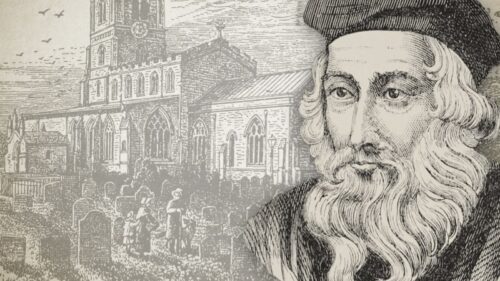George Ella
George M. Ella, born February 1939 in Yorkshire, England, has lived most of his life on the European Continent. He is a retired Senior Civil Servant formerly employed in teaching, post-graduate teacher-training, chairing examination boards and curricula work. He holds degrees from London, Hull, Uppsala, Essen, Duisburg and Marburg universities with doctorates in English Literature and Theology. Dr. Ella has written regularly since the seventies for a number of magazines and newspapers and published numerous books on Church History, including biographies of William Cowper, William Huntington, James Hervey, John Gill, Augustus Montague Toplady, Isaac McCoy and Henry Bullinger besides works on doctrine and education. He is currently finishing the third volume of his series 'Mountain Movers'; a biography of John Durie; a work on Law and Gospel and further study material for the Martin Bucer Seminar. Dr. Ella is still internationally active as a lecturer and is a Vice-President of the Protestant Reformation Society. He is keenly interested in missionary work and has written on the spread of the Gospel amongst the Same people of Lapland, the people of India and the Native Americans. This present volume follows Dr. Ella's 'The Covenant of Grace and Christian Baptism', also published by the Martin Bucer Seminar. George Ella is married to Erika Ella, nee Fleischman, a former government administrator, and they have two sons Mark (41), Director of a Polytechnic College in Bremerhaven and Robin (39), Leading Senior Physician in a newly-built Geriatric and Psychiatric clinic in Dessau.
George Ella on Doctrinal Matters
George Ella's Biographical Sketches
-
Henry Bullinger (1504-1575): Shepherd Of The Churches
It has long been my conviction that not half of the story of the Reformation has yet been told. Happily, great men and women of God who were true pioneers and upholders of reform are now being rediscovered causing a radical alteration in our knowledge and even convictions concerning how the true faith was revived after centuries of papal superstition. I have previously striven in these pages to rehabilitate forgotten English Reformers and introduced the great reforming work of Continentals such as Martin Bucer. Perhaps no Reformer, however, has been neglected in modern times as much as Swiss-born Henry Bullinger, once called, not inappropriately, ‘the common shepherd of all Christian churches’. Today, few seem to know that Bullinger produced far more sound Christian writings than…
-
Anne Hutchinson (1591-1643): The Failure Of The New England Experiment
Although it might be said that civil and ecclesiastical law were one in the Old Testament Dispensation, the New Testament clearly teaches that both non-Christians and Christians have civil rights and responsibilities and the powers that be, whether Christian or not, have an ordained duty to command obedience from the populace and maintain the right. Where New Testament Churches have usurped civil and secular authority by exercising Jewish case law and the authority of a Sanhedrin, they have failed in their calling as Christian leaders and reverted to un-Christian, and therefore worldly, means. Nowhere is this abuse of New Testament principles more crassly illustrated as in the so-called New England Experiment in general and the mocked-up trial of Anne Hutchinson in particular. Here we have…
-
John Albert Bengel
John Albert Bengel was born in Winnenden near Stuttgart on 24 July, 1687, the son of scholar-deacon Martin Albert Bengel. Martin Bengel took care of John’s early education but died of ‘an epidemic fever’ when John was six years of age. Then Louis XIV’s troops plundered the Bengels’ home and burnt it to the ground, destroying Martin Bengel’s valuable library which would have been a great support in John’s further education. Of these years of hardship, John testified that his best teacher was God Himself and that at his father’s death, he received a firm conviction that his Heavenly Father would be his best parent and educator. He began to pray fervently, read the Scriptures and devotional books and sought to walk worthy of God…
-
Christopher And Mary Love: Like Name, Like Nature A True Love Story
Christian writers usually stay clear of human love stories, perhaps thinking that narratives of marital fidelity and devoted loyalty, at their best, are but weak reflections of spiritual love devoted to Christ. However, the one in no way negates the other and the history of the Church presents us with some of the most beautiful love stories on record which have sadly not been given the pastoral and edifying role they deserve. One of the greatest love stories this writer has ever read is that of Christopher and Mary Love. Their deep fondness and loyalty to each other prove both a romantic and spiritual inspiration for both Christian and non-Christian alike. Furthermore, in stories of great men of God, wives are often given a subordinate…
-
Gerhard Tersteegen (1697-1769): Poet of Eternity
Gerhard Tersteegen is best known to English-speaking Christians through his hymns translated by Emma Francis Bevan, Francis Elizabeth Cox, William Delamotte, Sarah Findlater (with her sister Jane Borthwick), Melanchthon Woolsey Stryker, John Wesley and Catherine Winkworth. Most of these translation are, as Lady Durand confesses concerning her own renderings of Tersteegen, ‘imitations’ rather than translations and the numerous Tersteegen hymns to be found in English often lack the plaintive mourning of the poet over his sin, his sweet serenity in contemplating his salvation and his deep inward joy in believing. Tersteegen is now chiefly known for his poetry and hymns but in his own day, it was his preaching that moved men most. Emily Chisholm and Samuel Jackson have made some of Tersteegen’s sermons and…
-
Carl Olof Rosenius: And The Great Swedish Awakening
In the summer of 1960, I found myself in Northern Sweden helping Frans-Oscar Linde, a missionary to the Lapps. I was under great apprehension because I had recently sat for the London University Advanced Level General Certificates of Education with a view to continuing my course at London Bible College and matriculating for a London University BD degree. Two events put me at ease. First, a friendly pastor gave me a book called Korta dagbetraktelser by Carl Olof Rosenius. It was a collection of exquisite spiritual gems of daily readings throughout the year. After my conversion in Sweden, I had studied dry, Liberal works on the Bible and Church History in preparation for my A level in ‘Religious Knowledge’ so it was a real delight…








